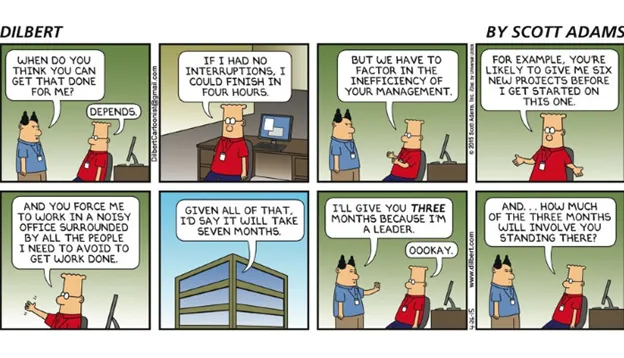I recently listened to the "Boss Class" podcast from The Economist, discussing how to do better management, and how to become a better manager. I am not anywhere near manager level in my professional career, but I listened to it anyway because I thought it would be beneficial. I learned a bunch of useful things in the podcast on how to be a good employee, which I will definitely have to do. Product management requires influence without superiority, and the best managers are able to influence without depending on their seniority.
The episodes spanned the pitfalls of the human brain, remote work, hiring, building teams, meetings, motivating employees, and managing yourself at work. The episode on managing yourself at work featured an interesting researcher: Cal Newport, a computer science professor at Georgetown who is more famous for his work on focusing than his work on computer science.
When he first started as a faculty member at MIT, Newport noticed that the best researchers were the ones who were able to focus for long periods of time. Which seems relatively straightforward — but sometimes, the most basic ideas are the best ones. He found that some people could "just stare at whiteboards for hours, writing major proofs," and he wanted to be like these people. He said that a sustained focus is what he has found to be the key to being more productive. He wrote a book called "Deep Work," where he goes in depth on his philosophy, pointing out that the modern era is the source of many of these issues. He highlights four "rules:"
- Work Deeply
- Embrace Boredom
- Quit Social Media
- Drain the Shallows
Work deeply means to actually do that — sit down, and do real work, and block out time for it. Embrace boredom means to allow yourself to be unstimulated, which leads perfectly into the third one, which is to quit social media, the ultimate stimulant. Finally, he says to do your best to eliminate "shallow" work — things like sending email, responding to Slack, and other things.
Much of these things are very recent developments. Newport is a big advocate of "time blocking," or planning out basically every minute of your day. He blocks out the time for deep work with a dark marker. He points out that the context switching that we do so often, like switching from writing to email to Slack to Twitter actually has a massive cognitive cost. Each of those switches up to and beyond 20 minutes. He likens it to taking a shot of a strong liquor every thirty minutes. It might seem fine in the moment, but later you will realize you didn't get anything done.
Context switching isn't all bad. Some researchers have found that task switching increases creativity by "reducing cognitive fixation."
He suggests using blocker software, where you can block your access to email or other distracting websites. Another tactic is to interval train. Focus for 20 minutes at a time, until that feels effortless. He claims that people can be able to focus for 90 minute intervals after just three months of training.
Whether being able to focus for over 90 minutes is useful is less clear. He visits an air traffic control room, and there, controllers are not allowed to work for over 90 minutes. After 90 minutes, it becomes very difficult. The head of "human factors" at the center he visits says that the usual person can keep sustained focus for 30 minutes — crucial for air traffic controllers. The maximum they allow their employees to focus is 90 minutes, because after that, they can't keep sustained focus.
Context switching seems bad. Focus should be real and is definitely difficult. Just because work looks deep does not make it so. Deep work includes no other stimuli and at first feels very challenging.

